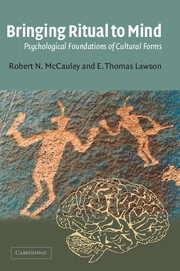Book contents
- Frontmatter
- Contents
- List of figures
- Preface
- 1 Cognitive constraints on religious ritual form: a theory of participants' competence with religious ritual systems
- 2 Ritual and memory: frequency and flashbulbs
- 3 Two hypotheses concerning religious ritual and emotional stimulation
- 4 Assessing the two hypotheses
- 5 General profiles of religious ritual systems: the emerging cognitive science of religion
- Notes
- References
- Index
1 - Cognitive constraints on religious ritual form: a theory of participants' competence with religious ritual systems
Published online by Cambridge University Press: 02 December 2009
- Frontmatter
- Contents
- List of figures
- Preface
- 1 Cognitive constraints on religious ritual form: a theory of participants' competence with religious ritual systems
- 2 Ritual and memory: frequency and flashbulbs
- 3 Two hypotheses concerning religious ritual and emotional stimulation
- 4 Assessing the two hypotheses
- 5 General profiles of religious ritual systems: the emerging cognitive science of religion
- Notes
- References
- Index
Summary
Paradoxes, puzzles, and explanatory problems
Some rituals captivate the imagination. Others provoke boredom.
We are easily moved, often excited, and occasionally even astounded by the sights, sounds, and smells accompanying ritual spectacles. These events stimulate our senses, enliven our emotions, and captivate our minds. The enthronement of popes, the inauguration of presidents, the burial of heroes arrest our attention and embed memories that last a lifetime. Everyone loves sensory pageantry. Some rituals focus the attention, feed the imagination, evoke the remembrance of things past as well as the desires of things to come, and inspire dramatic actions that stand out against their everyday background. Yet the salience of such dramatic spectacles should not obscure the fact that “ritual” often refers to the repetition of small and thoroughly mundane acts. Even though these rituals break with the ordinary world too, they frequently remain thoroughly humdrum. They trigger automatic responses that appear to be completely mindless. If we focus on participants' psychological responses in ritual situations, we cannot fail to notice the different degrees of emotion involved in these two sorts of cases. Some rituals are so emotionally arousing that their effects seem to last forever. In other rituals emotion seems to play little, if any, role.
Compare, for example, the comparatively lavish preparations for weddings and their impact on the participants' emotions with the more modest accouterments and emotional responses connected with routine blessings. The weddings quite regularly involve special music, clothes, foods, and more.
- Type
- Chapter
- Information
- Bringing Ritual to MindPsychological Foundations of Cultural Forms, pp. 1 - 37Publisher: Cambridge University PressPrint publication year: 2002
- 1
- Cited by

